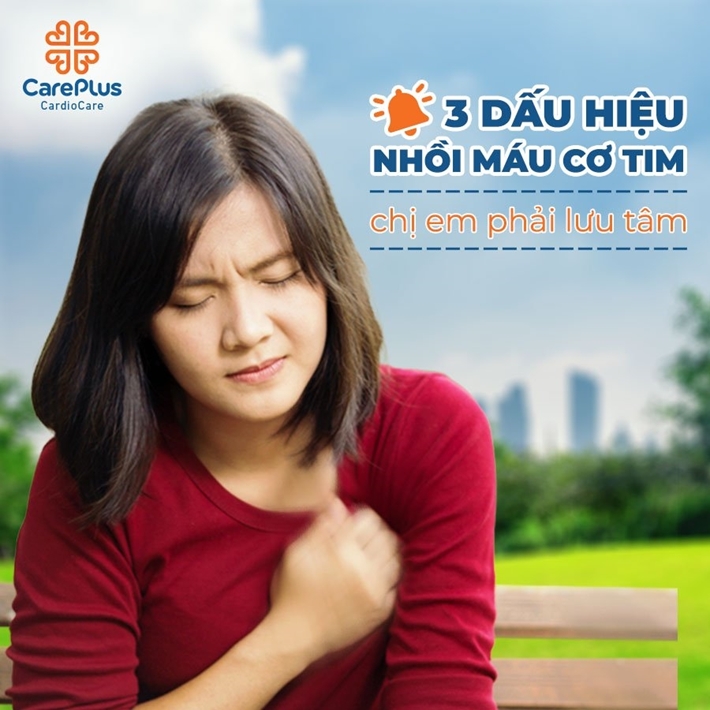3 difficult-to-detect signs of a heart attack women should not ignore
We often associate chest pain with myocardial infarction, which is accurate but insufficient because a significant proportion of patients with myocardial infarction have no symptoms of chest pain.

6/16/2021 3:49:50 PM
It is especially noticeable in women, as only about 50% of women experience chest pain during a heart attack. Women may have more subtle symptoms such as DIFFERENCE, DIFFICULTY, NARROW.
Also, chest pain is not always intense. It may just be a lingering feeling of heaviness or burning in the chest. Here are three symptoms to watch out for and some information about whether a condition is benign or more serious.
INCREDIBLE FEELING FEELING
As a woman, you are busy most of the day because there are often many things to do: housework, cooking, cleaning the house, social work, etc. As a result, you may often feel tired, and in most cases, this is normal. However, you must be alert if fatigue has recently appeared or is more severe than usual.
- Suddenly feeling very tired even doing the same things as usual
- Tired or feeling heavy in the chest even though you're not exerting yourself
- Simple activities like making the bed, going to the bathroom, shopping can also make you feel exhausted.
DIFFICULTY OR DRAINING
In older women, being inactive or gaining weight can cause shortness of breath. Menopausal women often complain that they have hot flashes. However, these symptoms can be signs of heart disease when:
- Sudden shortness of breath, sweating even without strenuous exercise
- Shortness of breath that gets worse with more extended exertion
- Shortness of breath is worse when lying down and less when you sit up
- Sweating, cold hands and feet even though there are no stressors for you
- Shortness of breath, sweating that occurs with chest pain or fatigue
NECKLACE, JACK ASSIST, BACK ACHE
Nature has endowed humans with such excellent biological structures that your body can send out alarm signals about medical conditions. When there is a problem with the heart, it stimulates the nerves in the heart, but other areas that share the same nerve roots can also be stimulated simultaneously.
Back pain, jaw pain, arm pain can be warning signs of heart disease, especially when the pain is not localized (a vague pain sensation over a large skin area, without a specific pain point) on bones, muscles, or joints). When the pain occurs right in the middle of strenuous exercise, stop and look for the following signs:
- Pain in the lower jaw or left arm. However, it should note that some women may experience pain in both hands, not just the left hand, as is the case in most men.
- The pain appears first in the chest, then spreads to the shoulder and back
- Pain that comes on suddenly, unrelated to exertion, can wake you up in the middle of the night
WHAT TO DO WHEN THE ABOVE SIGNS:
Many women had had these three signs for weeks and months before they had an acute myocardial infarction. The sooner you recognize these signs, the better your chances of preventing a heart attack. You need to pay attention and see a doctor right away.
WHEN COURSE A DOCTOR:
- Describe your symptoms and when they occurred Tell your doctor that people in your family have heart disease.
- Tell your doctor about stress or life problems that may be the cause of these symptoms. The doctor will measure pulse, blood pressure, electrocardiogram, echocardiogram, and blood test to assess the heart's damage (if any). These measures will help guide the management and prevention of future heart attacks.
WHEN TO CALL EMERGENCY (No. 115)
- When you feel pain or discomfort in your chest, especially if it lasts for more than 5 minutes, and are accompanied by the following symptoms, you need to contact a medical staff immediately:
- Pain or discomfort in the upper body (arm, left shoulder, back, neck, jaw, stomach (above the navel)
- Difficulty breathing or tired breathing
- Sweating, cold hands and feet
- Stomach full, indigestion, heartburn with burning
- Nausea or vomiting
- Dizziness, lightheadedness, weakness or anxiety
- Irregular or fast heartbeat, palpitations